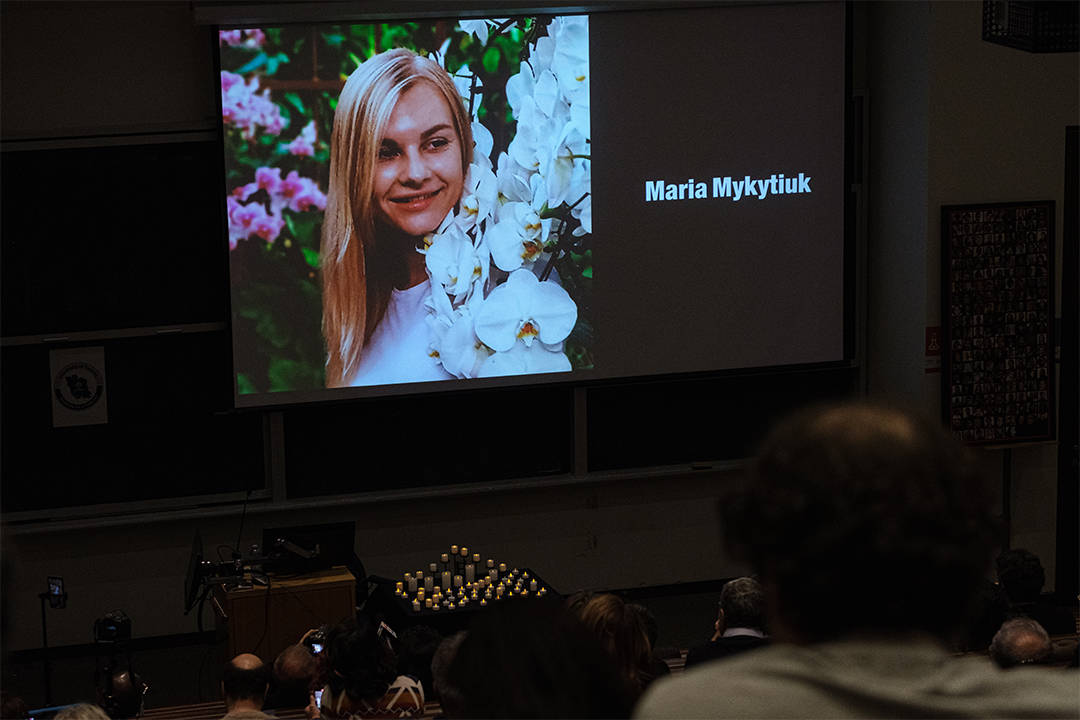Content warning: This article contains mentions of death.
“An international tragedy, a Canadian tragedy, and a University of Toronto tragedy” — that was how Niloofar Ganji, an executive member of University of Toronto Students for a Free Iran (UTSFI), described the 2020 downing of International Flight PS752 to a crowd gathered in the Bahen Centre.
The memorial service, organized by the UTSFI, took place on January 11 and marked the fourth-year anniversary of the PS752 crash.
On January 8, 2020, Iran’s Islamic Revolutionary Guard Corps (IRGC) shot down the Ukrainian Airlines flight minutes into its flight from Tehran to Kyiv. All 176 passengers onboard the flight lost their lives, including eight members of the U of T community: Mohammad Amin Jebelli; Mohammad Asadi Lari; Zeynab Asadi Lari; Mohammad Salehe; Zahra Hasani; Mohammad Mahdi Elyasi; Mojtaba Abbasnezhad; and Mohammad Amin Beiruti.
The event
The event, titled “The Quest for Truth and Justice: Remembering the Downing of Flight PS752,” began with an introductory speech from UTSFI members, who told the crowd that the event aimed to both commemorate the lives lost on the flight and serve as a rallying cry for “collective affirmation” of the community’s search for justice.
The student group led a moment of silence to remember the victims of the crash. Photos of the victims lay across the floor of the lecture hall where the event was held.
Professor Alexie Tcheuyap — associate vice-president and vice-provost, international student experience — spoke to the room on behalf of the university administration. Tcheuyap recognized the impact the crash had on the university community, reiterating that the university joins with the Iranian community in honouring the lives of the PS752 victims. “We miss them, and we all missed out on the many ways that they would have contributed to our society,” he said.
Tcheuyap further stressed the university’s commitment to memorializing the lives lost from the U of T community through the Iranian Student Memorial Scholarship, a needs-based scholarship available to international students from Iran and international or domestic students in Iranian studies at the undergraduate and graduate levels.
The event also included speeches from several community members who discussed the ongoing fight to bring justice for victims of the PS752 crash. The speakers spoke in Farsi, with English translations shown on a projector.
Mohsen Ahmadipour, whose spouse Roja Azadian died in the crash, outlined demands made to the Canadian government by the Association of Families of Flight PS752 Victims. The association, founded by families of victims, aims to “keep the memories of the passengers alive” and seek justice regarding the IRGC’s involvement in the crash.
The IRGC maintains that it shot down the flight due to “human error.” However, an investigation conducted by the Canadian government determined in June 2021 that the Iranian government and military “directly put Flight PS752 and other civilian aircraft in danger by creating conditions in which a SAM operator could launch missiles at them and by failing to take adequate preventative measures to reduce this high risk.” The military shot down the flight during a period of heightened US-Iran tensions; the Iranian military had launched missiles into Iraq hours earlier.
In June 2023, Canada, Sweden, Ukraine, and the United Kingdom brought a case against the Iranian government in the International Court of Justice (ICJ) to hold the Iranian government to account for shooting down the plane.
In a statement released on January 4, the association demanded that the Canadian government designate the IRGC as a terrorist organization and “initiate provisional measures” at the International Court of Justice related to the Iranian government’s mistreatment of the victims’ families. The statement also calls on the Royal Canadian Mounted Police to open a criminal case against the IRGC in Canada.
“I will not forgive until I see with my own eyes a better tomorrow for the children of that land, and I will never forget,” Ahmadipour told the crowd.
The second guest speaker, Saeid Dehghan, a human rights lawyer and author, discussed the legal processes for seeking truth and justice for the PS752 victims. He argued that the legal processes undertaken by the Iranian government played the role of a “show trial” that did not hold government officials transparently to account.
The third guest speaker, Atena Daemi, a human rights activist, spoke about the state of education in Iran, which she argued prioritizes “ideological instruction” over “academic education.” She reiterated the importance of supporting student activists by offering free online courses and providing scholarships and visas for expelled students who wish to continue their studies.
Daemi also spoke about the students who were killed during the 2022 “Woman, Life, Freedom,” protests and asked the crowd to stand in solidarity with those who “paid the ultimate price for seeking a peaceful sky over their homeland.” A September 2023 Amnesty International report found that, between September and December 2022, Iranian security forces unlawfully killed hundreds of protesters and bystanders and arbitrarily arrested tens of thousands.
Pouria Saffaran, a UTSFI member and first-year masters student in developmental psychology at the Ontario Institute for Studies in Education, told The Varsity that it was important that the student group continue to memorialize the downing of flight PS752 not as a single tragedy. Instead, they noted that the crash was one in a string of tragedies under the rule of Iran’s current regime. Saffaran reiterated that the group plans to continue working alongside the Iranian community, including the Association of Families of Flight PS752 Victims, and continue hosting events to accomplish that goal.


